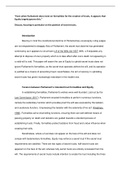“Even when Parliament does insist on formalities for the creation of trusts, it appears that
Equity largely ignores this.”
Discuss, focusing in particular on the position of secret trusts.
Introduction
Bearing in mind the constitutional doctrine of Parliamentary sovereignty ruling judges
are not empowered to disapply Acts of Parliament, the secret trust doctrine has generated
controversy as it appears to circumvent s.9 of the Wills Act 1837 (WA). s.9 stipulates any
attempt to dispose of one’s property which is to take effect after one’s death not appearing in
a valid will is void. This paper will assert the use of Equity to uphold secret trusts does not
ignore Parliament’s formalities, as the secret trust operates dehors the will, and its operation
is justified as a means of preventing fraud; nevertheless, the aim of secrecy in upholding
secret trusts has grown increasingly redundant in the modern era.
Tension between Parliament’s intended trust formalities and Equity
In establishing formalities, Parliament’s wishes were well-founded. Laid out by the
Law Commission (2017), Parliament enacted formalities to perform numerous functions,
namely the evidentiary function which provides proof the will was executed by the testator,
and cautionary function, ‘(impressing) the testator with the solemnity of his act’ (Friedman,
1966). Formalities serve channelling functions, ensuring there are well-defined means of
passing property on death and testators are guided towards a standard process of
establishing trusts. Finally, formalities protect testators from fraud and undue influence when
creating their wills.
Nonetheless, where a trust does not appear on the face of the will and does not
comply with testamentary formalities, Equity may enforce a secret trust if the secret trust
requirements are satisfied. There are two types of secret trusts; half-secret trusts are
apparent on the face of the will, whereas fully secret trusts are entirely concealed from the
will. The requirements of secret trusts include intention to create the trust including the three
, certainties (although they do not necessarily need to be found within the will),
communication of the trust to and acceptance of the trust by the legatee expressly or by
knowledge and acquiescence. The distinction between the requirements of half and fully
secret trusts lies in the time of communication. Terms of fully secret trusts must be
communicated and accepted prior to the testator’s death (Re Boyes). In contrast, the terms
of half-secret trusts must be communicated and accepted before or contemporaneously with
the execution of the will (Blackwell v Blackwell). Moreover, half-secret trusts have a further
requirement: any evidence used to prove the trust must be consistent with the terms of the
will (Re Huxtable). There are two central justifications for the disapplication of formalities in
order to uphold secret trusts, namely the fraud theory, buttressed by the equitable maxim,
Equity will not allow a statute to be used as an engine of fraud, and the dehors the will theory
(‘dehors theory’) established in Blackwell: secret trusts do not circumvent the WA 1837 as
they operate dehors (outside) the will.
Dehors the will theory
Although the dehors theory has been generally accepted by scholars, there is a
‘dichotomy of opinion’ regarding how and why secret trusts should fall outside the scope of
the WA 1837 (Allan, 2011). The generally favoured approach, advocated by Critchley (1999)
and Virgo (2018), argue secret trusts are express inter vivos trusts remaining unconstituted
until the testator’s death. An undeniable contradiction to this justification is the testamentary
nature of secret trusts, suggesting secret trusts cannot take effect as express trusts. As the
secret testator’s declaration of trust does not comply with s.9, it cannot be deemed a
‘testamentary disposition’, a term equated to ‘will’ in s.1 WA 1837. As explained by Lord
Buckmaster in Blackwell, rather than being a valid disposition, the testator’s declaration of
trust is an expression of ‘testamentary intention’. If a testator, while relying on their secret
trustee’s promise to materialise their intentions, dies, the secret trustee’s conscience will be
affected as it would be fraudulent of them not to carry out their promise. A constructive trust
arises at the moment of the testator’s death dehors the will; the secret trustee must fulfil their




